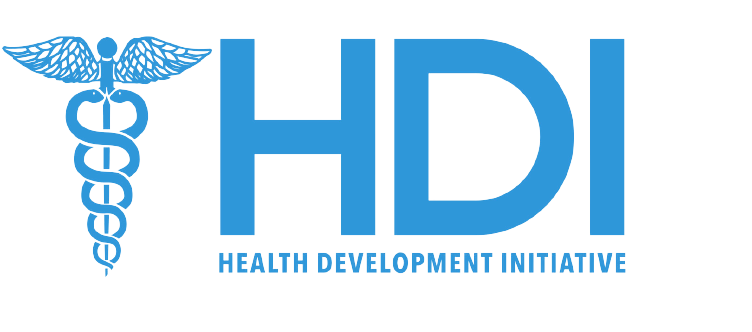HDI works hand-in-hand with those most in need to increase access to SRHR information and care. We empower and mobilize adolescents and young people with comprehensive sexuality education so that they can know and claim their rights. We also support women and girls in navigating access to information and services on family planning and safe abortion. We provide rights-based HIV services and education, and we work to transform the mindsets of current and future health professionals by equipping them with skills and knowledge to provide comprehensive, respectful and rights-based care.
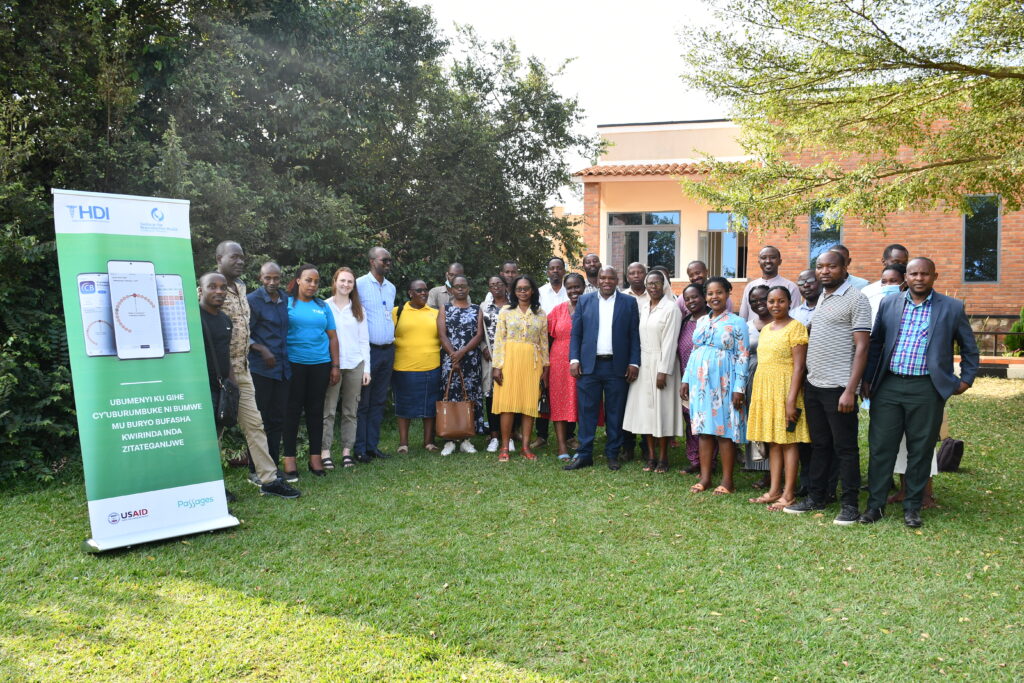
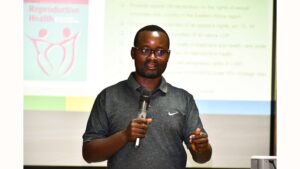
At the heart of HDI’s work on SRHR is its Centers for Health and Rights in Kicukiro and Nyakabanda. The Centers for Health and Rights are stigma-free and SRHR-friendly service models that HDI established to reach the most vulnerable populations in Rwanda with accurate and free information and services.
- Our Kicukiro clinic is a general clinic for those seeking SRHR services and information.
- Our Nyakabanda clinic is specialized in serving key populations (e.g. LGBTIQ+ individuals, people living with HIV, sex workers, and people who use drugs). The staff at our clinics are trained to provide stigma-free services and are welcoming of marginalized groups. However, we also receive many other clients, such as vulnerable groups like teenage mothers, domestic workers and adolescents, who know that HDI provides quality services free of discrimination.
At HDI, we engage, mobilize and build the capacity of both duty-bearers and rights-holders. These include:
- Women and girls
- Adolescents, young people and parents
- Teen mothers
- Key Populations (those most at risk of contracting HIV/AIDS): sex workers, men who have sex with men (MSM) and people who use drugs
- The LGBTI community
- Health and legal professionals
- Civil Society Organizations (CSOs)
- Faith-based organizations (FBOs) and religious groups
- Government institutions, legislators, local leaders & policy makers
- Law enforcement officers & the judiciary
- The media
- Teachers, students & institutions of learning
- Domestic workers
- Members of the general community
- Prisoners
- Refugees
- People with disabilities
The Centers offer screening for HIV/AIDS and STIs, pregnancy testing, advice on family planning, emergency contraceptives, pre and post-abortion counseling, support for those experiencing gender-based violence, and referral and legal aid for safe abortion. HDI has also used the Centers as an effective way to generate data and testimonies, which inform HDI’s advocacy initiatives and training materials. The Centers conduct outreach campaigns to ensure that even beneficiaries living in the most rural areas get access to accurate SRHR information. Center staff also train duty bearers on laws and policies concerning SRHR. Center staff partner with other organizations to be able to refer clients to services that HDI does not offer
 Our adolescent programming actively supports youth in a variety of ways. Through this programming, we have generated valuable data about adolescent SRHR challenges since 2008. We use this data and our platform as a trusted community organization to:
Our adolescent programming actively supports youth in a variety of ways. Through this programming, we have generated valuable data about adolescent SRHR challenges since 2008. We use this data and our platform as a trusted community organization to:
- Leverage access to information through educational school visits, our hotline, and mainstream and social media platforms to target adolescents and young people on various SRHR issues. To achieve this, we work with popular radio stations like KISS FM and Isango Star, as well as social media platforms including Twitter, Instagram and Facebookto host adolescent-focused programming. In particular, we host a popular educational series on YouTube called Ingamba.
- Build Networks: We also seek out passionate and motivated adolescents who show interest in SRHR issues through partnerships with schools, youth organizations, community centers, and offer workshops and mentorship programs to enhance their understanding and capabilities. We partner with adolescents to create safe and inclusive advocacy spaces where adolescents can come together, share experiences, and collaborate. These include the annual adolescent conference and the SRH student clubs formed in schools all over the country to encourage open dialogue, respect diverse opinions, and provide opportunities for networking and peer support.
- Encourage Advocacy and Action:We empower adolescent champions to become advocates for SRHR within their communities and support them in designing and implementing local initiatives, awareness campaigns, or projects that address SRHR challenges.
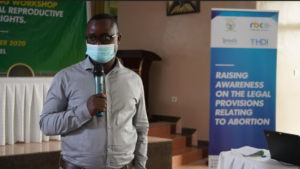 HDI sensitizes healthcare providers on the legal framework on abortion. Many healthcare providers lack information on the laws around safe abortion and hold conservative religious views on abortion, thus inadvertently (and sometimes intentionally) interfering with women’s legal right to abortion. To address this issue, HDI has been conducting nationwide campaigns to raise awareness on the legal framework on abortion among both beneficiaries and duty bearers.
HDI sensitizes healthcare providers on the legal framework on abortion. Many healthcare providers lack information on the laws around safe abortion and hold conservative religious views on abortion, thus inadvertently (and sometimes intentionally) interfering with women’s legal right to abortion. To address this issue, HDI has been conducting nationwide campaigns to raise awareness on the legal framework on abortion among both beneficiaries and duty bearers.
We also engage public and private health facilities, healthcare providers, the media, legal practitioners, women’s rights organizations, Rwanda Investigation Bureau (RIB), Isange One-Stop Center (an outpatient department service designed for delivering care to victims of gender-based violence; typically stationed at government-run health facilities)
HDI supports individuals seeking safe abortion with:
- Free, safe pre- and post- abortion counseling
- Legal and medical counseling and care for vulnerable women and girls seeking safe abortion
- Referrals, linkage and orientation to health facilities for care and treatment
- Legal aid around safe abortion services
- Accompaniment to health facilities, provision of transportation, and financial aid to vulnerable women who are unable to afford services on their own
- Information about eligibility for abortion services, and guidance through each step of the abortion journey through HDI’s Center for Health and Rights Call Center
- Information related to the Ministerial Order on Safe Abortion
Since 2018, HDI has supported over 3,000 women and girls to exercise their right to safe abortion.
HDI implements fertility awareness methods (FAM) – a strategy that couples can use to prevent pregnancy which involves tracking a woman’s fertility and menstrual cycle, developing a better awareness of women’s body and use of a variety of non-pharmaceutical methods to detect ovulation.
In partnership with USAID, HDI is currently engaged in the Fertility Awareness Method (FAM) project. The project’s objectives are to:
- Expand the use of self-administered family planning methods

- To engage local faith-based organizations (FBOs) in enhancing access, quality, and equity to a full range of post-partum family planning (PPFP) methods for all women delivering in the targeted FBO facilities.
- Improve organizational and technical capacity and performance of HDI
Every year, HDI leads numerous outreach campaigns to promote HIV testing, adherence to antiretroviral drug (ARV) schedules, and to address misconceptions in the community regarding HIV/AIDS. These outreach campaigns reach thousands of beneficiaries at a time and provide a safe space for beneficiaries to get tested for HIV and STIs.
- Since 2007, HDI has tested over 75,000 beneficiaries for HIV/AIDS.
- For the last 6 years, HDI has been training and supporting peer educators of female sex workers and LGBTQIA+ particularly in HIV prevention.
- In order to combat HIV/AIDS among key populations, HDI has implemented several projects targeting key populations on HIV including increasing access to quality and stigma-free HIV and TB services for key and priority populations.
- Through the Center for Health and Rights HDI offers confidential, stigma-free testing for HIV/AIDS and STIs.
- HDI strives to help the Rwandan health care system overcome major barriers to HIV/ AIDS service uptake, including social exclusion, marginalization, criminalization, and stigma of key populations.
- HDI offers the following HIV/AIDS-related services in-house:
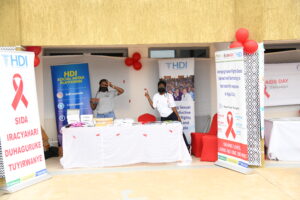 Screening
Screening- Education and Awareness
- Pre-Exposure Prophylaxis [PrEP]
- Psycho-social support for those affected
HDI pursues activities related to the fight for gender equality, positive masculinity, the fight against gender-based violence, and efforts to mainstream gender in all areas of life. In particular, HDI conducts campaigns and sensitization meetings, which mobilize young men and women, faith leaders, the media, and other critical actors to promote gender justice and prevent gender-based violence on and offline. These projects also engage policy makers in order to promote the creation of policies and laws that are gender-transformative.

In addition to sensitizing faith leaders, HDI takes pride in its work to empower feminist and women-led organization to actively join and participate in the broader SRHR movement. These organizations are encouraged and equipped to register and advocate on issues that affect them.
HDI provides refresher trainings on SRHR, sensitization on SRHR laws and policies, values clarification training, and training on provision of stigma-free healthcare services. All of these trainings aim to create a network of healthcare providers who provide friendly services to all people, regardless of social, cultural, or economic background.
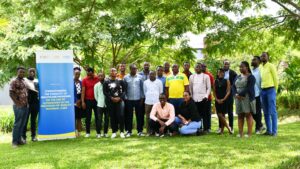
HDI believes that in order to have the greatest impact on the future of SRHR, sensitization on stigma-free, non-discriminatory healthcare must begin with the newest generation of healthcare providers. This year, HDI trained 400 final year medical students on the importance of providing stigma-free safe abortion services to women and girls, the Ministerial Order on Abortion, post abortion care, and family planning. HDI is building the capacity of these future healthcare providers to become valuable resources for women and girls seeking safe abortion and their fellow physicians.
HDI believes that in order to have the greatest impact on the future of SRHR, sensitization on stigma-free, non-discriminatory healthcare must begin with the newest generation of healthcare providers. HDI trains healthcare providers on:
- The importance of providing stigma-free services to women and girls and Key Populations
- The Ministerial Order on Abortion & laws determining offenses and penalties in general
- Pre- and post-abortion care
- Family planning
- Value Clarification and Attitude Transformation (VCAT) training
HDI collaborates with different institutions such as:
- Rwanda Medical Students for Choice
- Rwanda Medical Doctors for
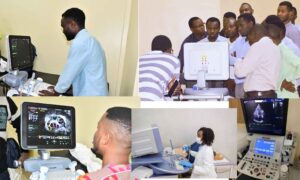 Choice
Choice- Medical Students’ Association of Rwanda
- Rwanda Society for Obstetricians and Gynecologists
- Ministry of Health, Rwanda Biomedical Center
- Rwanda Association of Midwives

